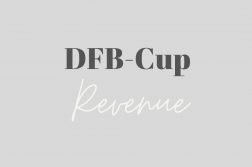Participation in the DFB Cup can play an enormous financial role, especially for the clubs in the lower leagues. More about the financial income possibilities here.
To participate the lower-class clubs first have to be qualifyed for the DFB-Pokal.
Which clubs can participate in the DFB Pokal?
The participants in the DFB Pokal are divided as follows:
- 1. Bundesliga: Rank 1-18: 18 Clubs
- 2. Bundesliga: Rank 1-18: 18 Clubs
- 3. Liga: Rank 1-4: 4 Clubs (Because FC Bayern Munich was 1st in the 3. Liga rank 5 is qualified)
- 21 Winners of the “Landespokal” in the Federal States: 21 Clubs
- Bavaria, “Niedersachsen” and “Westfalen” as the biggest federal associations: 3 Clubs
Therefore the 36 professional teams of the 1. Bundesliga and 2. Bundesliga of the past season as well as Rank 1 to 4 in the 3rd league are thus seeded in each cup season.
The national associations (“Landesverbände”) distribute the other 24 starting places.
Initially, 21 starting places are allocated via the cup competitions of the 21 national associations (“Landespokal”).
How do clubs qualify for the DFB Pokal via the competitions of the 21 national associations?
Initially, only clubs from the 3rd division and amateur teams from the lower divisions are eligible to participate in the national cups, with the number of participants varying from one association to another.
Usually the teams of the top leagues (3rd league, regional league (4th league) and Oberliga (5th league) are automatically eligible, while the other clubs of the lower leagues have to qualify via district, county or city cups.
At least in theory, this means that even a district league club can register for the DFB Pokal.
The other three places being awarded as follows:
Niedersachsen: In the 2019/2020 season two cup competitions were held. While in the first competition only the teams from the 3rd league and regional league (4th league) took part, in the second competition all amateur teams below the regional league competed. Both cup winners qualified for the DFB-Pokal.
Westfalen: In addition to the winner of the national cup since 2015/2016, the winner of the deciding match between the champion of the Oberliga Westphalia (5th league) and the best Westphalian team from the Regionalliga West (4th league) also qualifies for the DFB Cup.
In Bavaria, the best placed amateur club from the regional league (4th league) is allowed to participate in the DFB Cup as Bavarian Amateur Champion in addition to the winner of the State Cup.
Second teams of licensed clubs are not eligible to participate in the DFB Pokal matches; if the winner of an association cup is a second team of a licensed club or a team of a club that has already qualified for the DFB Pokal with a team, the next placed and eligible team in the cup competition of the national association shall take its place.
If the champion, the second-, third- or fourth-placed team of the 3rd league is a second team of a licensed club or if the champion, the second-, third- or fourth-placed team of the 3rd league has already qualified for the DFB Pokal via the association cup competition of the respective national association, the next placed and eligible team in the table of the 3rd league or the next placed and eligible team in the cup competition of the national association shall take their place.
The participants at the DFB-Pokal 2020/2021:
1.Bundesliga (Saison 19/20)
- FC Bayern München
- Borussia Dortmund
- RB Leipzig
- Borussia Mönchengladbach
- Bayer Leverkusen
- TSG Hoffenheim
- VfL Wolfsburg
- SC Freiburg
- Eintracht Frankfurt
- Hertha BSC
- Union Berlin
- FC Schalke 04
- FSV Mainz 05
- 1. FC Köln
- FC Augsburg
- Werder Bremen
- Fortuna Düsseldorf
- SC Paderborn
2. Bundesliga (Saison 19/20)
- Arminia Bielefeld
- VfB Stuttgart
- FC Heidenheim
- Hamburger SV
- SV Darmstadt
- Hannover 96
- Erzgebirge Aue
- VfL Bochum
- SpVgg Greuther Fürth
- SV Sandhausen
- Holstein Kiel
- Jahn Regensburg
- VfL Osnabrück
- FC St. Pauli
- Karlsruher SC
- FC Nürnberg
- SV Wehen Wiesbaden
- Dynamo Dresden
3. Liga
- Würzburger Kickers (als Zweiter der 3. Liga)
- Eintracht Braunschweig (als Dritter der 3. Liga)
- FC Ingolstadt (als Vierter der 3. Liga)
- MSV Duisburg (da der FC Bayern München II Erster wurde, rückt der Fünftplatzierte nach)
- Waldhof Mannheim (Sieger des Baden-Pokal)
- FC Hansa Rostock (Sieger des Pokals in Mecklenburg-Vorpommern)
- 1860 München (Sieger des Pokals in Bayern)
- 1. FC Magdeburg (FSA-Pokal: Da der FSA-Pokal 2019/20 vor Absolvierung der Halbfinalpartien aufgrund der COVID-19-Pandemie abgebrochen wurde, einigten sich die betroffenen Teilnehmer sowie der Fußballverband Sachsen-Anhalt darauf, den 1. FC Magdeburg als Teilnehmer für den DFB-Pokal zu melden)
- FC Kaiserslautern (Sieger des Pokals in Südwest)
Regionalliga (4th League)
- 1. FC Schweinfurt 05 (als Bayerischer Amateurmeister)
- VSG Altglienicke (Sieger des Berlin-Pokals)
- FSV Union Fürstenwalde (Sieger des Pokals in Brandenburg)
- FC Oberneuland (Sieger des Bremen-Pokals)
- Eintracht Norderstedt (Sieger des Hamburg-Pokals)
- TSV Steinbach Haiger (als Sieger des Pokals in Hessen)
- Rot-Weiss Essen (Sieger des Niederrheinpokals)
- TSV Havelse (Sieger des Niedersachsen-Pokals für Dritt- und Regionalligisten)
- SV Elversberg (Sieger des Saarlandpokals)
- Chemnitzer FC (Sieger des Pokals in Sachsen)
- FC Carl Zeiss Jena (Sieger des Pokals in Thüringen)
- SSV Ulm 1846 Fußball (Sieger des Pokals in Württemberg)
- SC Wiedenbrück (Sieger des Entscheidungsspiels Westfalen)
Oberliga (5th League)
- 1. FC Düren (Sieger des Mittelrheinpokals)
- MTV Eintracht Celle (Sieger des Pokals in Niedersachsen für Amateure)
- FV Engers 07 (Sieger des Pokals im Rheinland)
- SV Todesfelde (Sieger des Pokals in Schleswig-Holstein)
- 1. FC Rielasingen-Arlen (Sieger des Pokals in Südbaden)
- RSV Meinerzhagen (Sieger des Pokals in Westfalen)



Discussion1 Comment
Pingback: Revenue Distribution DFB-Pokal Season 2020/2021